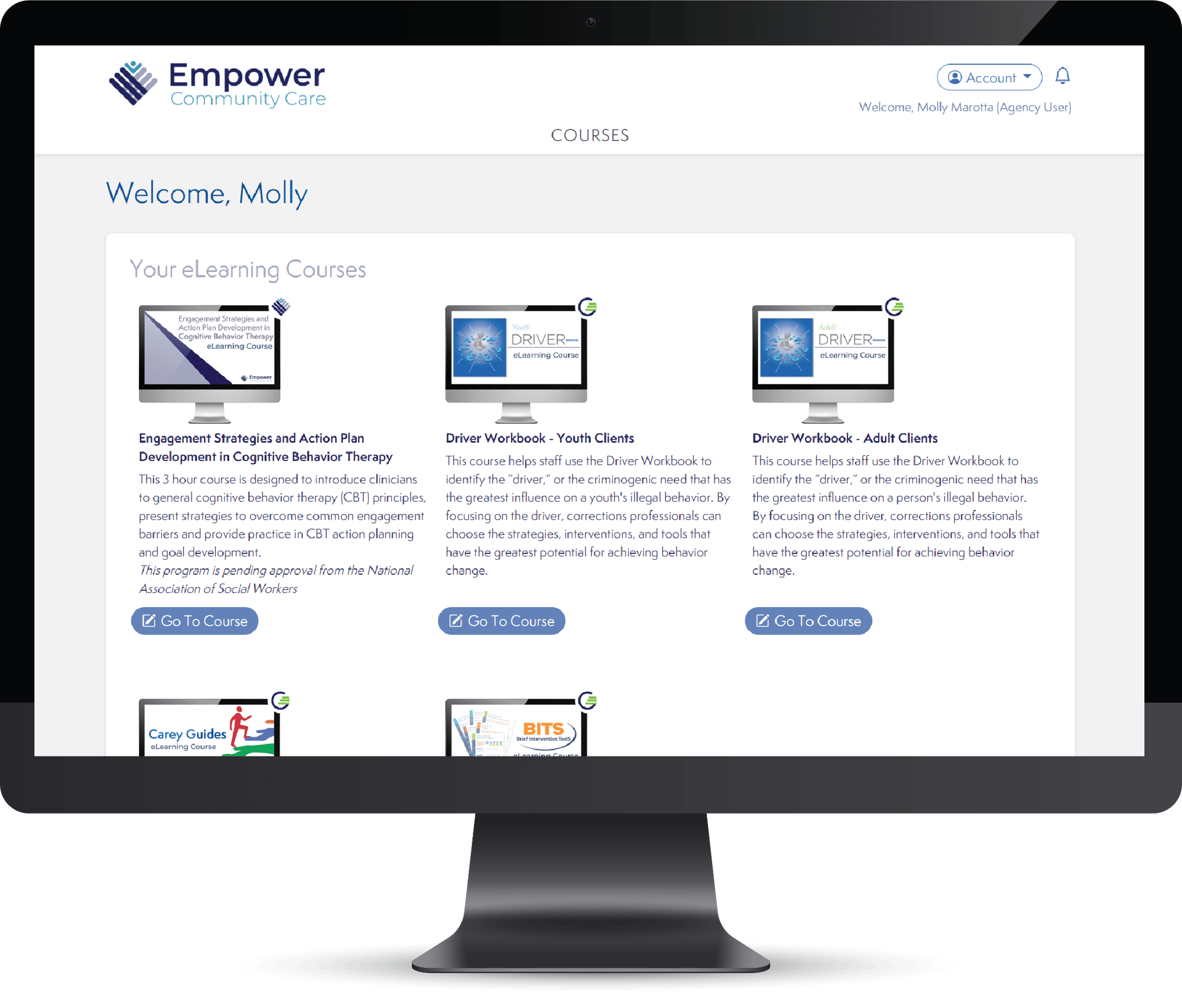Staff Training

Staff Training
For Justice System, Child Welfare, Mental and Behavioral Health Professionals
At Carey Group, we are dedicated to empowering professionals in the justice system, child welfare, behavioral and mental health sectors. Our tailored staff training sessions are expert-developed and designed to enhance the skills and knowledge of individuals working in these critical fields.
Staff Training Courses
Virtual, in-person, and eLearning formats offered
Train-the-trainer opportunities
Booster training courses available
Course 1: Evidence-based Practice Overview
Intended Audience: Agencies and stakeholders who play a role or work with adults or youth involved in the justice system. Course customizable for supervisors, line staff, or stakeholders/service providers.
Course Length: 1 day
Now, more than ever, it is critical for agencies to implement practices that, according to research, produce positive results in terms of behavior change, risk reduction, and improved outcomes for clients and communities. This course answers that need by explaining the research related to evidence-based practices and by giving participants specific do’s and don’ts for providing effective client interventions and supervision. Concepts explained in this class are foundational to building capacity for future learning and skill development.
Course 2: Motivational Interviewing
Intended Audience: Behavioral health, child welfare, corrections, and community corrections professionals who work with adults or youth.
Course Length: 2 days
Motivational interviewing (MI) is a collaborative communication style that provides the groundwork for developing professional alliances, which is critical to helping people build skills and successfully implement risk reduction strategies. This hands-on course provides staff with the knowledge and understanding of how to use MI to increase engagement and to identify, elicit, and respond to change talk. Participants also practice skills needed to effectively address and respond to resistance toward change.
Course 3: Four Core Competencies
Intended Audience: Corrections and community corrections professionals who work with adults or youth. Course customizable for supervisors, line staff, or both.
Course Length: 2 Days
Skills matter when it comes to reducing recidivism rates and increasing long-term positive behavior change. This course gives participants the opportunity to learn and practice skills related to four core competencies: developing professional relationships, creating effective case plans and case management strategies, conducting skill practice to address criminogenic needs, and using appropriate responses to shape behavior.
Course 4: Tools Training – Carey Guides, Brief Intervention ToolS (BITS), and Driver Workbook
Intended Audience: Corrections and community corrections professionals who work with adults or youth. Course customizable for supervisors, line staff, or both. Options: Carey Guides, BITS, and/or Driver Workbook courses.
Course Length: 1 or 2 days
The Carey Guides, Brief Intervention ToolS (BITS), and Driver Workbook are cognitive behavioral tools that make it possible for professionals to identify and address the most influential criminogenic needs that lead to risk reduction and case management concerns. Staff interactions will become more impactful after taking this hands-on course where they will learn about and practice using these tools to successfully move people through the change process.
Course 5: Effective Case Planning and Management
Intended Audience: Corrections and community corrections professionals who work with adults or youth. Customizable for supervisors, line staff, or both.
Course Length: 1 or 2 days
From the “why” to the “how,” this course connects all the dots when it comes to effective case planning and management: engaging clients, interpreting and sharing assessment results, identifying the driver and skills to develop, and collaborating with clients to create meaningful case plans that will serve as a roadmap to success. Skills learned in this course, which is adapted to reflect agency policies and practices, are fundamental for staff who supervise, guide, and move people toward positive change.
Course 6: Supervisor’s EBP BriefCASE
Intended Audience: Supervisors, facilitators, leads, and staff development personnel of corrections and community corrections agencies working with adults or youth.
Additional Option: Manager’s EBP BriefCASE to help executive-level staff advance their evidence-based organizations.
Course Length: 1 or 2 days
This skill-based course will develop participants’ capacity to use the Supervisor’s EBP BriefCASE—a high-quality booster curriculum—to teach staff, coach them, and reinforce their use of evidence-based practices. During the course, participants will become familiar with the contents of the BriefCASE, practice facilitating several modules, and leave prepared to use the BriefCASE at future staff learning events, whether for new hires, rotations, or refresher trainings.
Course 7: Risk Reduction Coaching for Supervisors
Intended Audience: Supervisors of corrections and community corrections professionals who work with adults or youth.
Course Length: 1 day
Supervisors play a critical role in helping their staff incorporate and transfer skills learned in training to everyday practice. This course helps supervisors develop the qualities and abilities needed to provide ongoing support, coaching, and feedback to help staff successfully integrate skills related to risk reduction into their work.
Course 8: Continuous Quality Improvement (CQI)/Coaching
Intended Audience: Leadership, managers, and quality assurance staff of corrections and community corrections agencies working with adults or youth.
Course Length: 1 day
Most change efforts fail because important implementation and post-implementation strategies are overlooked, but this doesn’t have to be the case. Through a process of continuous quality improvement, agencies can ensure ongoing success in achieving recidivism reduction goals. This course assists participants in developing an action plan that provides them with a roadmap, tools, and strategies critical to ensuring fidelity to evidence-based practices.
Booster Trainings
Protect your investment and show staff you are committed to implementing practices and building on skills learned in prior courses by providing booster training. Booster trainings increase sustainability and allow staff the opportunity to advance their knowledge, share experiences, ask clarifying questions, and strengthen their confidence and ability to deliver interventions more effectively. It is recommended that staff complete booster training 6–12 months following initial training.
Carey Group offers booster trainings for most core courses. We also provide two courses that specifically serve as boosters:
Achieving Risk Reduction Through Effective Staff Interventions
Intended Audience: Corrections and community corrections professionals who work with adults or youth. Course customizable for supervisors, line staff, or both.
Course Length: 1 day
This course, which reinforces learnings from the Evidence-Based Practices Overview and Four Core Competencies courses, outlines seven key steps to helping people who are justice-involved with behavior change and reviews research associated with the risk, need, and responsivity principles; effective interventions; professional alliance; and behavior management practices. Participants practice using risk reduction tools and identify interventions that are and are not effective in reducing recidivism. Each element learned in this course can be applied in one-on-one interactions to improve client outcomes.
Reducing Recidivism 20 Minutes at a Time
Intended Audience: Corrections and community corrections professionals who work with adults or youth.
Course length: 1 day
This course answers the question, “I know what I am supposed to do, but how can I do it in the short amount of time I have?” Like a great recipe, this course takes all the ingredients and steps needed to help people build skills that lead to behavior change and puts them together in a way that bears desired results. Participants will discuss their successes and challenges, brainstorm strategies to overcome barriers, identify skills needed to address criminogenic needs, learn the steps for teaching and practicing skills, and conduct an appointment from start to finish using a structured format.
Train-the-Trainer
All of Carey Group’s courses, except for Motivational Interviewing, are available as TTTs.
Our train-the-trainers courses are a great way for agencies to sustain their training efforts and reinforce a culture of learning. Agency trainers will be trained on a high-quality ready-made curriculum that will ensure consistency in staff education. A Carey Group master trainer will review each module in the curriculum, participants will have multiple opportunities to present various sections of the material, and the master trainer will ensure that participants leave ready and prepared to conduct the training.
Our innovative eLearning platform offers a variety of self-paced courses, allowing staff members to improve their skills at their own convenience and flexibility.
Course topics include the following:
Evidence-based Practices Overview
Professional Boundaries in Adult Correctional Facility Settings
Professional Boundaries in Adult Community Settings
Overview Training for Select Carey Group Tools (Carey Guides, Brief Intervention Tools (BITs), and the Driver Workbooks)
And More!
Features
- Accredited: Features courses that are approved by the National Association of Social Workers (NASW) and the National Board for Certified Counselors (NBCC) for Continuing Education Credit.
- Self-paced: Pick up where you left off and learn at your own pace
- Cost-friendly: Affordable, eliminates the need for travel to attend an in-person training
- Research-based: Courses are expert-developed and based on evidence-based research in the human services, mental health, and justice system fields.

